To bee or not to bee - Many things are compromised!
Honeybees (Apis mellifera) are social insects that conform very well organized groups or hives.
In the hive every single individual has a specific function, they all work to preserve the well-being of the entire community. The individuals in the hive are able to identify among themselves thanks to pheromones ("smells") that they emit. It is of major importance that the hive keeps a perfect balance in temperature, humidity and hygienic state, alongside that, theres an obvious need for food, that some other members supply for.
We all know the whole previous statement, I am sure of that. But, allow me -as always- to deepen a bit into some topics, with the hope of bringing new info to your heads; my dear readers.
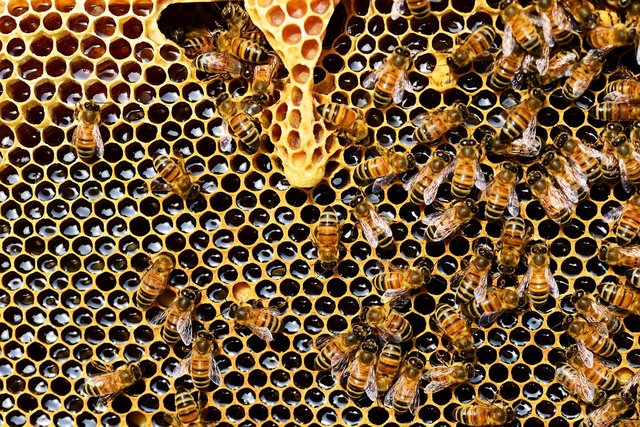
The hive
There's a hierarchy inside the hive: Headed by the queen, only fertile female thanks to the special food the other females of the colony provide for her. She's fed with "royal jelly" instead of honey and pollen.
Once she reaches her sexual maturity, the queen leaves the hive and is mates with several drones, the males of the hive. Those, are born for that sole purpose, then... are left to die.
Here's where a modern feminist drops a small tear of happiness.
After that nuptial flight, the queen returns to the hive and goes into a chamber where she'll produce eggs until she dies. They live around 5 years and lay around 1500 eggs a day. Those eggs are placed in small cells where they are fed (first with royal jelly, later with honey and pollen).
The worker bees are in charge of all the jobs in the hive are are independent of the "reproductive" process itself. As soon as they emerge from their craddle/cell they work: Build and clean the hive, feed the larvae and the queen, and play the role of air conditioner to keep the humidity and temperature at an ideal level by flapping their wings.
Later, the worker bees go outside and collect pollen and nectar, explore new places and defend the hive from potential threats.
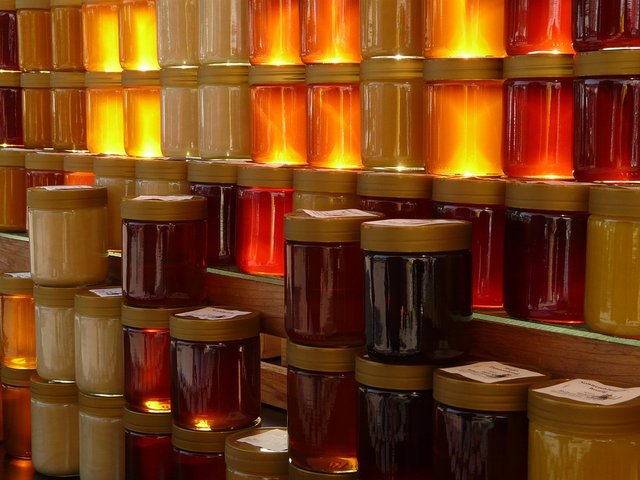
Bee's production.
During the entire existence of the hive, the workers produce and stockpile different substances that mankind has been interested in since the stone age. The one everyone knows is for sure: Honey. Produced out of the nectar that is collected from flowers, they mix it with their own saliva that contains certain enzymes (sucrase) that break down the vegetal sucrose into glucose and fructose.
Do you want your tea with some bee vomit instead of sugar?
Honey has several other uses besides the gastronomic ones, it's therapeutic traits (antiseptic and antibacterial) is still used today by some.
Propolis is another product, it is made out of the resinous secretions in plants. They use it to seal holes in the hive. Its composition does vary depending on the region, some being mixtures of up to 50 different resins, oils and pollen. This compound is also used by us thanks to its HUGE medicinal potential, it is also antiseptic, antimicrobial, fungicidal, antiviral, anticancer, anti-age and anti-inflammatory.
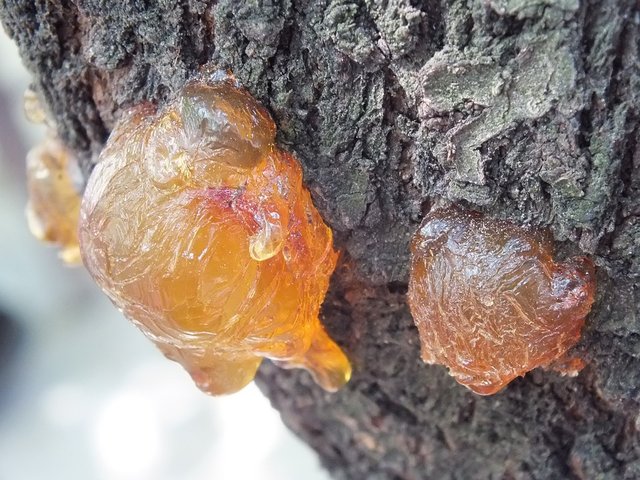
Honey, propolis... Don't forget a vital one for us: Wax the one we used at a moment to manufacture candles, varnishes, ointments. They also have their poisonous sting (with potential -you guessed it- medicinal uses we are still studying).
We also exploit the royal jelly, it is highly nutritive and has a high content of vitamins so we use it as a nutritive complement.
The bee's ecologic role.
We do not only benefit from bees by leeching their hard work in a direct way. They play a vital role in the pollination of the fields we grow our food at. This, alone, is a benefit a hundred of times higher than any other benefit we get from their products.
At some places, the pollination of plants is done by bees in 80% of the cases, they are VERY GOOD at it.
They are endangered, constantly, by chemicals in the crops (I don't want to point a finger, but we know what company became famous for their rather "immoral" method of profit) and the consequential weakness that leaves them open to infections... and death.
The climate change is hitting them hard, lack of flowers and changes in temperature that they cannot fight against are constantly causing trouble to bees and beekeepers.
It is in our hands to bee the ones that keep this species alive.
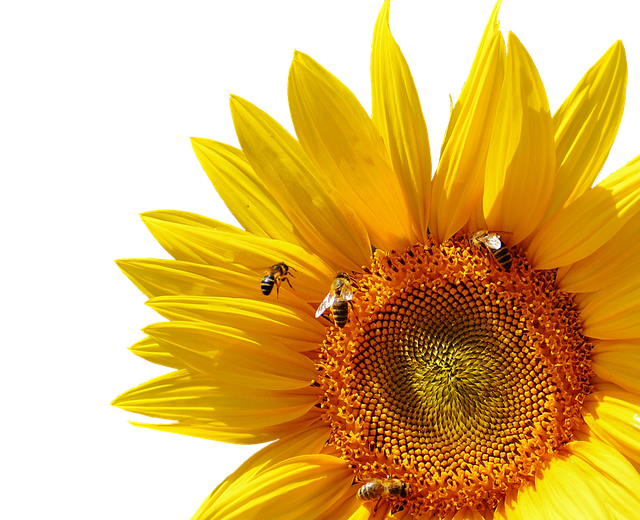
75% of all food crops in the world, and 90 percent of all wild plants are independent on animal pollination from Bee's so it's really important we don't lose this source otherwise we need to create synthetical flower polllution by machine or by hand.
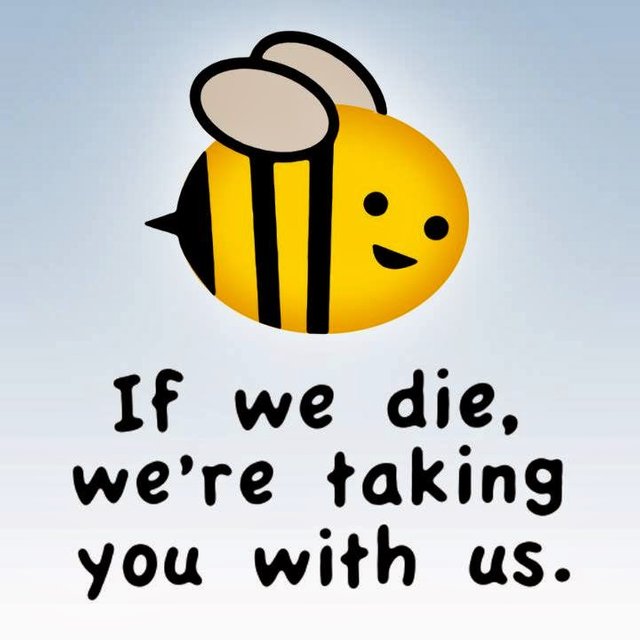
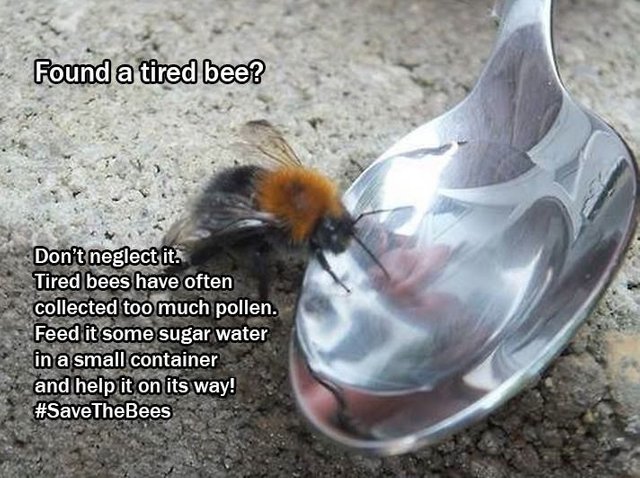
IMG FROM https://spiritandanimal.wordpress.com/
So respect these little creatures ♥
IMG FROM https://s-media-cache-ak0.pinimg.com
I've been doing this for bee's , that's why I want to send you this message and I hope the people who are reading this will do the same <3
great !
Great read and an informative article. Save the bees! Thanks.
I always use honey for cosmetic masks, for lemonade and tea. Very important to know is that honey loses its properties if it is introduced into hot drinks
Indeed, as many other things, if you burn them, they decompose into other compounds.
At 37°C most antibacterial enzymes are destroyed.
beautiful post. enjoyed your lines.
It's simple. To be.
To Bee.
This post has received a 1.33 % upvote from @booster thanks to: @renzoarg.
You're right, we need to start paying attention to the small citizens of our world. The engine of the biosystem are the small species, not the large ones.
Please keep writing those kind of content :)
Followed and resteemed @renzoarg
You may have a look at this if you are interested in supporting animal foundations dedicated to save extincting species:
https://steemit.com/animals/@ddot/vonate-for-aid-2-borneos-orangutan-s-help-abel-and-her-tribe
Greetings,
@ddot
The discussion of bee mating reminds me of something weird that happened a few weeks ago. I was sitting next to a beehive and watching them come and go when a drone landed on the side of the hive and started walking toward the entrance. The drones don't have any sting, so beekeepers practice picking them up so that we can get good at in case we need to catch a queen to move her around. So I grabbed the drone by his wings and flipped him upside down to get a good look at him and this thing came shooting out of his abdomen. It was huge compared to the size of the bee and had some tentacle-like things sticking out to the sides.
It turns out that (I Googled it, of course) the thing was his phalus! If you pick up a drone, turn him upside down, and squeeze just right he will ejaculate and die instantly. I felt a little bit sad because I had wasted his one shot for glory, but it was fascinating.
Enjoyed reading your post. Very well organized and informative. Wish more people knew how important bees are to our existence. Thanks 🐓🐓